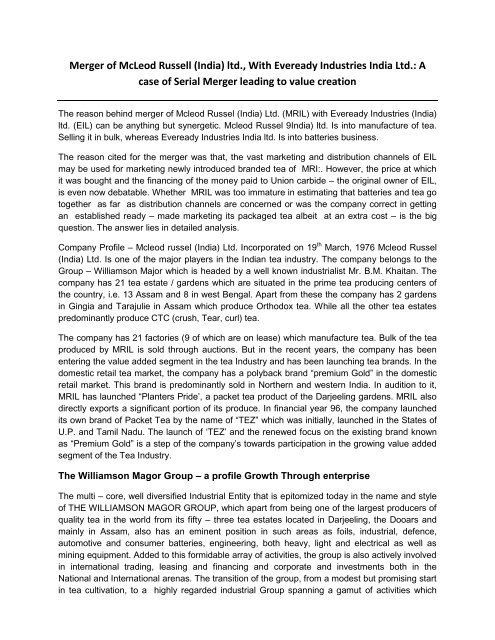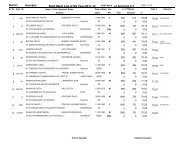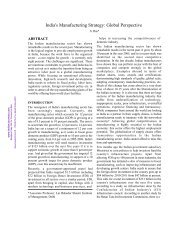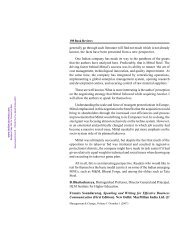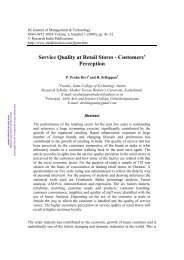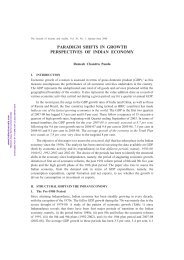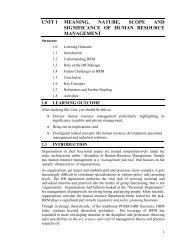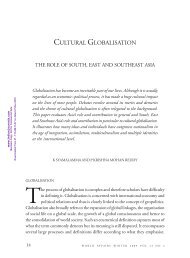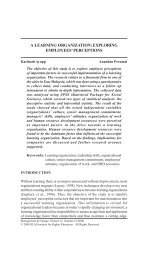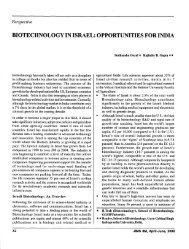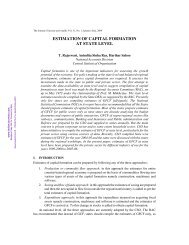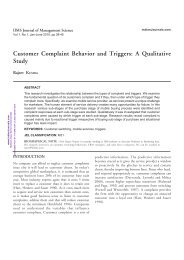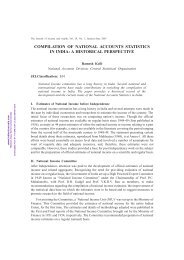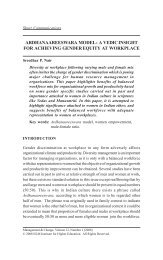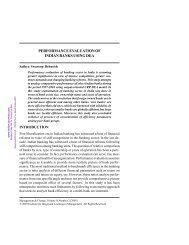case of williomsen and everday merger.pdf - Mimts.org
case of williomsen and everday merger.pdf - Mimts.org
case of williomsen and everday merger.pdf - Mimts.org
You also want an ePaper? Increase the reach of your titles
YUMPU automatically turns print PDFs into web optimized ePapers that Google loves.
Merger <strong>of</strong> McLeod Russell (India) ltd., With Eveready Industries India Ltd.: A<br />
<strong>case</strong> <strong>of</strong> Serial Merger leading to value creation<br />
The reason behind <strong>merger</strong> <strong>of</strong> Mcleod Russel (India) Ltd. (MRIL) with Eveready Industries (India)<br />
ltd. (EIL) can be anything but synergetic. Mcleod Russel 9India) ltd. Is into manufacture <strong>of</strong> tea.<br />
Selling it in bulk, whereas Eveready Industries India ltd. Is into batteries business.<br />
The reason cited for the <strong>merger</strong> was that, the vast marketing <strong>and</strong> distribution channels <strong>of</strong> EIL<br />
may be used for marketing newly introduced br<strong>and</strong>ed tea <strong>of</strong> MRI:. However, the price at which<br />
it was bought <strong>and</strong> the financing <strong>of</strong> the money paid to Union carbide – the original owner <strong>of</strong> EIL,<br />
is even now debatable. Whether MRIL was too immature in estimating that batteries <strong>and</strong> tea go<br />
together as far as distribution channels are concerned or was the company correct in getting<br />
an established ready – made marketing its packaged tea albeit at an extra cost – is the big<br />
question. The answer lies in detailed analysis.<br />
Company Pr<strong>of</strong>ile – Mcleod russel (India) Ltd. Incorporated on 19 th March, 1976 Mcleod Russel<br />
(India) Ltd. Is one <strong>of</strong> the major players in the Indian tea industry. The company belongs to the<br />
Group – Williamson Major which is headed by a well known industrialist Mr. B.M. Khaitan. The<br />
company has 21 tea estate / gardens which are situated in the prime tea producing centers <strong>of</strong><br />
the country, i.e. 13 Assam <strong>and</strong> 8 in west Bengal. Apart from these the company has 2 gardens<br />
in Gingia <strong>and</strong> Tarajulie in Assam which produce Orthodox tea. While all the other tea estates<br />
predominantly produce CTC (crush, Tear, curl) tea.<br />
The company has 21 factories (9 <strong>of</strong> which are on lease) which manufacture tea. Bulk <strong>of</strong> the tea<br />
produced by MRIL is sold through auctions. But in the recent years, the company has been<br />
entering the value added segment in the tea Industry <strong>and</strong> has been launching tea br<strong>and</strong>s. In the<br />
domestic retail tea market, the company has a polyback br<strong>and</strong> “premium Gold” in the domestic<br />
retail market. This br<strong>and</strong> is predominantly sold in Northern <strong>and</strong> western India. In audition to it,<br />
MRIL has launched “Planters Pride‟, a packet tea product <strong>of</strong> the Darjeeling gardens. MRIL also<br />
directly exports a significant portion <strong>of</strong> its produce. In financial year 96, the company launched<br />
its own br<strong>and</strong> <strong>of</strong> Packet Tea by the name <strong>of</strong> “TEZ” which was initially, launched in the States <strong>of</strong><br />
U.P. <strong>and</strong> Tamil Nadu. The launch <strong>of</strong> „TEZ‟ <strong>and</strong> the renewed focus on the existing br<strong>and</strong> known<br />
as “Premium Gold” is a step <strong>of</strong> the company‟s towards participation in the growing value added<br />
segment <strong>of</strong> the Tea Industry.<br />
The Williamson Magor Group – a pr<strong>of</strong>ile Growth Through enterprise<br />
The multi – core, well diversified Industrial Entity that is epitomized today in the name <strong>and</strong> style<br />
<strong>of</strong> THE WILLIAMSON MAGOR GROUP, which apart from being one <strong>of</strong> the largest producers <strong>of</strong><br />
quality tea in the world from its fifty – three tea estates located in Darjeeling, the Dooars <strong>and</strong><br />
mainly in Assam, also has an eminent position in such areas as foils, industrial, defence,<br />
automotive <strong>and</strong> consumer batteries, engineering, both heavy, light <strong>and</strong> electrical as well as<br />
mining equipment. Added to this formidable array <strong>of</strong> activities, the group is also actively involved<br />
in international trading, leasing <strong>and</strong> financing <strong>and</strong> corporate <strong>and</strong> investments both in the<br />
National <strong>and</strong> International arenas. The transition <strong>of</strong> the group, from a modest but promising start<br />
in tea cultivation, to a highly regarded industrial Group spanning a gamut <strong>of</strong> activities which
forms an integral part <strong>of</strong> the entire Indian Economy <strong>and</strong> earns valuable Foreign exchange for<br />
the country, has been achieved over a period <strong>of</strong> 125 years, with the last twenty years witnessing<br />
the accelerated transformation <strong>of</strong> the Group from an exclusive tea manufacturer <strong>and</strong> exporter,<br />
to a formidable industrial conglomerate, <strong>and</strong> presents a fascinating saga <strong>of</strong> the spirit <strong>of</strong><br />
enterprise natured <strong>and</strong> developed by three prominent <strong>and</strong> enlightened families.<br />
Two <strong>of</strong> these families, the Williamson Family <strong>and</strong> the magor Family hail from U.K. <strong>and</strong> were<br />
amongst the pioneers in establishing their presence <strong>and</strong> in the development <strong>of</strong> the tea industry<br />
in India. The third<br />
Family, which traces its lineage from one <strong>of</strong> the finest families, originally from Rajasthan, namely<br />
the Khaitan Family, has played a crucial role in enhancing <strong>and</strong> developing the present wide<br />
horizons <strong>of</strong> the Williamson magor Group.<br />
The group, originally bearing the name WILLIAMSON MAGOR which symbolized the successful<br />
partnership <strong>of</strong> the Williamson <strong>and</strong> magor Families respectively, suffered the loss <strong>of</strong> the<br />
presence <strong>of</strong> the Williamson Family in the late fifties. This void was fortuitously filled with the<br />
timely entry <strong>of</strong> the Khaitan Family. The patriarch <strong>of</strong> the family, Mr. B.M. Khaitan took the reins <strong>of</strong><br />
the Company <strong>and</strong> firmly guided its impressive growth in the Tea Industry in a rare display <strong>of</strong><br />
entrepreneurial harmony with the magor Family, based in the United Kingdom with long lasting<br />
<strong>and</strong> intricate ties with the Tea Industry in India.<br />
The tremendous goodwill <strong>of</strong> the corporate entity <strong>of</strong> Williamson magor was by then established in<br />
the tea industry <strong>and</strong> it was from this well this well built base that the Group, spearheaded the<br />
vision <strong>and</strong> foresight <strong>of</strong> Mr. B.M. Khaitan, began treading the path <strong>of</strong> diversification. This was<br />
manifest in the <strong>merger</strong> <strong>of</strong> another premier British Company, Macneill & Barry Limited, which had<br />
wide ranging interests in tea. Office equipment <strong>and</strong> engineering, with Williamson Magor, in 1974<br />
– 75. With the activities <strong>of</strong> the merged Group now encompassing more than just tea, it was<br />
logically to identify the Group by re- naming it MACNEILL & MAGOR.<br />
Never one to rests on his laurels, Mr. B.M. Khaitan looked further ahead <strong>and</strong> widened the<br />
horizons by intricately timing the acquisitions <strong>of</strong> the two other pivotal corporate entities, namely<br />
India Foils Limited <strong>and</strong> st<strong>and</strong>ard Batteries Limited, both holding pre-eminent positions in their<br />
respective fields. This was closely followed by another well – conceived investment – this time<br />
in the Group‟s original area <strong>of</strong> activity – tea. With the induction <strong>of</strong> the Mcleaod Russel / Makum<br />
– Namdang Group <strong>of</strong> tea companies – a medium sized but highly pr<strong>of</strong>itable constituent <strong>of</strong> Tea<br />
Industry, into the larger Macneill & Magor Group, the conglomerate <strong>of</strong> Macneill <strong>and</strong> magor<br />
achieved its zenith in the Tea Industry, by merging as the largest producer <strong>of</strong> tea worldwide.<br />
In keeping with contemporary management philosophy, vertical integration <strong>of</strong> the wide based<br />
group had been achieved. The most recent phase <strong>of</strong> this phenomenal growth <strong>of</strong> the Group was<br />
witnessed by the astute move <strong>of</strong> acquiring the Indian Business <strong>of</strong> the famous multi – national,<br />
Union Carbide, which amongst other product lines was <strong>and</strong> is best known as the producer <strong>of</strong> the<br />
br<strong>and</strong> <strong>of</strong> EVEREADY” Batteries.<br />
Today, the group is acknowledged as one <strong>of</strong> the finest in the country with keen entrepreneurial<br />
skill visibly evident at the very top <strong>and</strong> reflected in the next generation <strong>of</strong> both <strong>of</strong> these unique<br />
<strong>and</strong> talented families – Mr. Philip magor, son <strong>of</strong> Mr. R.B. Magor is actively involved with the
traditional Tea Activities <strong>of</strong> the group while Mr. Deepak khaitan <strong>and</strong> Mr. Aditya Khaitan, sons <strong>of</strong><br />
Mr. B.N. Khaitan are at the helm <strong>of</strong> affairs in India, ably guiding the group to the 21 st century to<br />
be fully capable <strong>of</strong> meeting the technological challenges <strong>of</strong> the future with conviction in the<br />
corporate philosophy that changes for the sake <strong>of</strong> change in an <strong>org</strong>anization is as dangerous<br />
as blind loyality to the past. It is a well conceived <strong>and</strong> implemented blend <strong>of</strong> continuity <strong>and</strong><br />
innovation that makes the difference between a mere legal corporate entity <strong>and</strong> one which is<br />
truly geared to continually strive for higher performance, while simultaneously fulfilling more<br />
than its expected role as a responsible corporate citizen <strong>of</strong> the country.<br />
Acquisition <strong>of</strong> Union Carbide Ltd. By W & M Group<br />
The priced Union Carbide India Ltd. Now changed to Eveready Industries India Ltd. (EIIL) has<br />
been acquired by four W & M group companies – McLeod Russel (the flag ship <strong>of</strong> W&M group,<br />
Namdang Tea, Williamson Finacial Services <strong>and</strong> Salsar Industrial Services – with the former<br />
taking the lead. The justification in acquiring EIIL at an investment <strong>of</strong> Rs 290 crore was justified<br />
by the goodwill, br<strong>and</strong> equity enjoyed by the Eveready br<strong>and</strong> <strong>and</strong> the country – wide marketing<br />
network <strong>of</strong> EIIL. Also, the group felt that it could leverage the huge distribution <strong>and</strong> marketing<br />
network <strong>of</strong> EIIL for selling MRIL br<strong>and</strong> tea in packets not only in cities but also in remote<br />
villages. To acquire a controlling stake in EIIL McLeod Russel resorted to borrowings in a big<br />
way through a financial arrangement with a consortium <strong>of</strong> banks <strong>and</strong> financial institutions for<br />
bridge finance for Rs.250 crore <strong>and</strong> an internal accruals <strong>of</strong> Rs.40 crore the company acquired<br />
the controlling stake <strong>of</strong> EIIL. The company planned to retire this costly debt through a Euro –<br />
issue but decided against it <strong>and</strong> planned to raise the money through a rights cum public issue.<br />
In 1995, McLeod Russel (India) Ltd. Planned to raise Rs. 302 crore through rights-cum public<br />
issues.<br />
But the right –cum public issue <strong>of</strong> 1,59,39,500 equity shares at a premium <strong>of</strong> Rs.180 per share<br />
in May / june 1995 was not successful mainly due to the depressed market conditions <strong>and</strong> also<br />
due to the high premium charged by the company, though the group companies fully subscribed<br />
to the issue(but it was subscribed fully according to the company in the annual report for the<br />
year 1995 -96).The impact <strong>of</strong> the high cost <strong>of</strong> borrowings is clearly visible in the increase in the<br />
borrowings <strong>of</strong> the company from Rs. 30.75 core in financial year 94 to Rs. 398.80 crore in<br />
financial year 95. The result <strong>of</strong> the high interest rates, dealing operating margins affected the<br />
pr<strong>of</strong>itability <strong>of</strong> the company. The operation margins in financial year 96 declined to 22 percent<br />
from 29 percent in financial year 95. In the same period, the net margins slipped to 2.61 percent<br />
from 12.62 in financial year 95 due to high interest costs. But the net pr<strong>of</strong>its <strong>of</strong> the company<br />
were buoyed up in the period from Rs.9.81 core in financial year 94 to Rs. 17.49 crore in<br />
financial year 95 <strong>and</strong> to Rs. 28.00 corer mainly due to high other income <strong>of</strong> Rs. 16.13 crore in<br />
financial year 95 <strong>and</strong> Rs. 22.66 corer in financial year96.<br />
Major Subsidiary<br />
Union Carbide <strong>of</strong> India Ltd. (UCIL)<br />
The company made a modest beginning in India in 1905 with marketing <strong>of</strong> dry batteries <strong>and</strong><br />
flashlights with a consignment <strong>of</strong> batteries valued Rs.500. Ever – ready Co. (Great Britain) Ltd.
Started manufacture <strong>of</strong> dry cell batteries at Calcutta in 1926 with a capacity <strong>of</strong> 60 lakh cells a<br />
year with imported components. Ever – Ready Co. (India) Ltd. Bought over the Ever – Ready<br />
Co. (Great Britain) in 1934 <strong>and</strong> was incorporated in that year in India as private company. The<br />
name. The name <strong>of</strong> the company was changed to National Carbon Co. (India) Ltd. In 1941 <strong>and</strong><br />
to Union Carbide India Ltd. In 1959. The battery facility was further exp<strong>and</strong>ed <strong>and</strong> in 1940 a<br />
large battery plant with an initial capacity <strong>of</strong> 40 million dry cells was established in Calcutta. In<br />
1956 the company set up the first zinc rolling mill to manufacture zinc alloys <strong>and</strong> photo<br />
engraves‟ plate at Calcutta. In 1959 a modern flashlight <strong>case</strong> factory was inaugurated at<br />
Lucknow. Chemicals <strong>and</strong> plastics plant was commissioned in 1961.<br />
It set up a petrochemical complex in Bombay <strong>and</strong> a naphtha cracking unit along with associated<br />
facilities was inaugurated in 1966. Plant was set up at Calcutta in 1965 for the manufacture <strong>of</strong><br />
midget electrodes & cinemas are carbons. Battery plant at Hyderabad was set up in 1966.<br />
Pesticides formulation plant at Bhopal commenced production in 1969. In 1971 the electrolytic<br />
manganese dioxide plant at Bombay was commissioned. In the same year the company<br />
commenced marine products operations – 100% EOU. In 1979 the company completed the<br />
expansion facilities at Bhopal for basic technical required to produce a range <strong>of</strong> MIC – based<br />
pesticide.<br />
By the 1980s, UCIL diversified its product range <strong>and</strong> was into batteries, carbon <strong>and</strong> metals,<br />
plastics, marine products <strong>and</strong> agricultural chemicals, eventually the scope <strong>of</strong> the operations<br />
increased <strong>and</strong> the company operated 15 plants at eight locations, including the headquarters in<br />
Calcutta. Bhopal pesticides plant remained closed from December 1984 following gas leak at<br />
MIC plant. The leakage <strong>of</strong> MIC a deadly poison claimed more than 4000 lives <strong>and</strong> more than<br />
20,000 injured. After the leakage the Bhopal unit was closed as in early, 1985 the Government<br />
<strong>of</strong> India cancelled the operating license <strong>of</strong> the Bhopal plant clearing the way for the plant‟s<br />
dismantlement. After a few months after the disaster, the parent company Union Carbide<br />
Corporation (USA) faced lawsuits in amounts far exceeding the company‟s net worth. A further<br />
few months later, the efforts <strong>of</strong> the parent company to recover from the disaster <strong>and</strong> restore its<br />
favorable public image suffered further due to leakages in the company‟s chemical plants in<br />
USA. A few years later the parent company was taken over by GAF Corporation USA which<br />
increased its stake in the company. Till the end <strong>of</strong> 1985, there were few indications <strong>of</strong> progress<br />
in the settlement <strong>of</strong> the lawsuits against the company <strong>and</strong> UCIL was essentially out <strong>of</strong> the<br />
pesticide business although the company‟s other divisions, especially those involving the<br />
batteries <strong>and</strong> flashlights remained pr<strong>of</strong>itable. In 1989 the Chemicals <strong>and</strong> plastics unit at Mumbai<br />
was bought over by Oswal Agro Mills. In 1994, the company was taken over by Mcleod Russel<br />
Co. <strong>of</strong> Williamson Magor Group which acquired 50.9% stake in it.<br />
Product Groups<br />
The various product groups <strong>of</strong> the company include dry batteries, flashlights, electrolytic<br />
manganese dioxide, carbons <strong>and</strong> metals <strong>and</strong> trading. The takeover <strong>of</strong> erstwhile Union Carbide<br />
by Williamson magor group was mainly to utilize the vast distribution network <strong>of</strong> the company.<br />
The company in the few years tried to utilize the distribution network to sell detergent products<br />
under an arrangement with SPIC Fine Chemicals Ltd. But due to operational difficulties the sale<br />
<strong>of</strong> detergent products was discontinued during the last quarter <strong>of</strong> the financial year 96. During<br />
financial year 96, the company commenced marketing, distribution <strong>and</strong> sale <strong>of</strong> packet tea
procured from the group company Mcleod Russel (India) Ltd., under the br<strong>and</strong> name „Tez‟. The<br />
product was initially launched in the States <strong>of</strong> Uttar Pradesh <strong>and</strong> Tamil Nadu, <strong>and</strong> the results<br />
have been encouraging. In the beginning <strong>of</strong> financial year 97, the company entered into an<br />
agreement with Hindustan Latex Ltd. For the distribution <strong>of</strong> condoms under the well established<br />
br<strong>and</strong> name “Nirodh”.<br />
Geographic Scope <strong>of</strong> operations<br />
Plant Locations <strong>and</strong> their major product/s<br />
1. Calcutta (Calcutta, WB) Batteries, Arc photo Engravers‟<br />
Plates / Strips for printing, Carbon Electrodes<br />
2. Chennai (madras, TN) Batteries<br />
3. Hyderabad (Hyderabad, AP) Batteries, Electrolytic Manganese Dioxide<br />
4. Lucknow (Lucknow, UP) Flashlight Cases, Castings, hard Facing & Tube Rods<br />
5. Srinagar (Srinagar, J&K) Batteries<br />
Product Market Scope<br />
Operations Review <strong>of</strong> EIL in financial Year96<br />
Dry Battery Cells<br />
The strong recoveries <strong>of</strong> the Indian economy <strong>and</strong> good industrial growth have helped in higher<br />
dem<strong>and</strong> for consumer goods <strong>and</strong> commodities including dry batteries <strong>and</strong> flashlights (the major<br />
products) <strong>of</strong> EIL.<br />
The dry battery market was buoyant during the year, <strong>and</strong> “Eveready” battery sales increased by<br />
12% over the previous year to record an all time high <strong>of</strong> 655 million pieces. In financial year 96,<br />
the company launched several new products, <strong>and</strong> has chalked out plans for capacity expansion<br />
<strong>and</strong> modernization so as to remain ahead <strong>of</strong> the anticipated growth in dem<strong>and</strong>. In financial year<br />
96, capacity utilization <strong>and</strong> productivity at the company‟s plants improved with the actions<br />
initiated in earlier years, In financial year 96, the company received technology inputs from<br />
Eveready battery Company Inc., USA (EBC) for improving carbon zinc battery <strong>and</strong> flashlight<br />
operations. This would help the company in improving plant efficiencies, process capabilities<br />
<strong>and</strong> in implementing the world Class maintenance program at all manufacturing location, which<br />
is an identified key thrust area for developing World Class Manufacturing competency.<br />
Flashlights<br />
Production <strong>of</strong> flashlights at the company‟s Lucknow plant was high despite labor troubles.<br />
Flashlight sales were at 9.4 million pieces for which dem<strong>and</strong> continues to be strong.<br />
Carbons <strong>and</strong> metals<br />
Despite stagnant market <strong>and</strong> increased competitive activity, sales <strong>of</strong> both cinema are carbons<br />
<strong>and</strong> photoengravers‟ plates were maintained at the previous year‟s levels.
Electrolytic Manganese Dioxide<br />
Domestic sales <strong>of</strong> the products improved significantly as exports were unremunerative due to<br />
lower international prices.<br />
Joint venture<br />
The company in financial year96 entered into a joint venture with Ralston Purina Overseas<br />
battery Company Inc. USA 9the owner <strong>of</strong> the Eveready br<strong>and</strong> name world wide) to develop the<br />
Alkaline battery business in India under the world – renowned br<strong>and</strong> “energizer” <strong>and</strong> under the<br />
company Energizer India Limited (EIL) in which EIL holds 49 percent <strong>and</strong> PROBC holds 51<br />
percent. The distribution <strong>and</strong> sales <strong>of</strong> this niche product by the company has been encouraging.<br />
Diversification<br />
During financial year 96, the company marketed silver oxide watch batteries under the<br />
“Eveready” br<strong>and</strong> name <strong>and</strong> plans to eventually manufacture these batteries. The company is<br />
also exploring opportunities for diversification <strong>and</strong> growth in other sectors <strong>of</strong> the battery industry,<br />
including the rechargeable segment, as well as exports. The company has progressed well for<br />
setting up a state <strong>of</strong> the art plastic processing unit for manufacturing components for captive<br />
consumption as well as battery operated plastic appliances.<br />
Expansions<br />
The company is implementing a Rs. 40 crore project at Tamil Nadu for the manufacture <strong>of</strong> 30<br />
million pieces <strong>of</strong> alkaline battery. It also hopes to spend a substantial amount on modernization<br />
<strong>and</strong> up gradation <strong>of</strong> existing facilities at all plants. The company has about 45% market share in<br />
1.30 billion dry cell market <strong>and</strong> sells its products under the br<strong>and</strong> name Eveready. The company<br />
is further exp<strong>and</strong>ing capacity with a view to meet the growing dem<strong>and</strong>s. Eveready is setting up<br />
a plastic processing unit for the manufacture <strong>of</strong> components for captive consumption <strong>and</strong><br />
battery operated plastic appliances.<br />
Project<br />
Location<br />
Project<br />
Type<br />
Product<br />
Capacity<br />
Cost<br />
Status<br />
Alkaline Battery<br />
Project<br />
Chennai, Madras (TN)<br />
New Unit<br />
Alkaline batteries<br />
30.00 mln.pcs.<br />
40.00 crores<br />
Under implementation<br />
Solid Performance<br />
The financial performance <strong>of</strong> Eveready Industries Ltd recorded significant gains during financial<br />
year 96, with both sales <strong>and</strong> pr<strong>of</strong>its recording new highs. The performance <strong>of</strong> the company has<br />
been noteworthy that despite sever competitive pressures, sales volume <strong>of</strong> dry batteries, the<br />
major product line <strong>of</strong> the company, increased by 12 percent resulting in an increase <strong>of</strong> sales
from Rs. 364.67 crore to rs. 411.52 Crore. This enabled the company‟s net pr<strong>of</strong>it to improve by<br />
9% to Rs. 26.71 crores. The actual net pr<strong>of</strong>it increased to Rs. 34.36 crore in financial year 96 an<br />
increase <strong>of</strong> 40% over the previous year if the sale <strong>of</strong> investments <strong>of</strong> Rs. 7.65 crore too are<br />
included.<br />
Merger<br />
According to the management Consultancy Mckinsey & Co had advised the company a couple<br />
<strong>of</strong> years back on the restructuring <strong>of</strong> the group. Subject to various approvals, McLeod Russel<br />
(India) is to be merged with its subsidiary, Eveready Industries India (formerly Union Carbide<br />
India) with retrospective effect from 1, April 1996. The merged entity is to be called Eveready<br />
Industries India Ltd. The share exchange ratio has been decided as three shares <strong>of</strong> mcleod<br />
Russel (India) for two shares <strong>of</strong> Eveready Industries. The logic for the <strong>merger</strong> as enunciated by<br />
the company is that, the products <strong>of</strong> McLeod Russel i.e. tea is to use the distribution network <strong>of</strong><br />
McLeod Russel comprising <strong>of</strong> 4,000 distributors having direct access to 5,00,000 retail outlets to<br />
market teas. Accordingly, the company plants to use EIIL‟s massive marketing network for<br />
promoting Tez, an extra strong CTC tea br<strong>and</strong> that MRIL has launched. Before the <strong>merger</strong>,<br />
MRIL sold around 95 percent <strong>of</strong> its tea in bulk form. In addition to the above, the <strong>merger</strong> was to<br />
provide financial synergies <strong>and</strong> the post – <strong>merger</strong> entity will be in a position to substantially raise<br />
its borrowings limit than Rs.300 crore each for both the companies before the <strong>merger</strong>. At<br />
present, the Williamson Magor group holds about 62 percent in Mcleod Russel, while financial<br />
institutions hold 14 percent in it. Foreign holdings are about 14 percent <strong>and</strong> the public <strong>and</strong><br />
others hold about 9 percent in Mcleod Russel. In the post –<strong>merger</strong> entity, the Williamson magor<br />
group is expected to have a stake <strong>of</strong> about 46 percent, financial institutions will have a stake <strong>of</strong><br />
about 23 percent <strong>and</strong> 31 percent stake will be with the public <strong>and</strong> others.<br />
Why they should not merge?<br />
After the <strong>merger</strong> Williamson Magor group will now be driven by batteries rather than by tea. Of<br />
the Rs.570 crore combined turnover <strong>of</strong> the merged company, nearly 70 percent will come from<br />
batteries.<br />
Also in practice the <strong>merger</strong> has been a cover – up to merge a financially weak company mcleod<br />
Russel with a pr<strong>of</strong>it making Eveready industries Ltd. In financial year96, the cash flow from<br />
operations <strong>of</strong> MRL were a negative Rs. 4.4 crore as against Rs. 3.42 crore in financial year 95.<br />
While for EIIL, the cash flow from operations were a positive Rs.30.9 crore in financial year 96<br />
as against Rs.8.43 crore in financial year 95.<br />
Two, there are no operational synergies between the distribution <strong>of</strong> Batteries <strong>and</strong> tea though<br />
EIIL has one <strong>of</strong> the strong retail outlets in the country. The selling cycles for the two are also<br />
different. While tea sales reach a peak in the first week <strong>of</strong> the month, battery cells sell evenly<br />
through the month. Selling tea <strong>and</strong> batteries will have to be two separate businesses. For<br />
example carbon zinc batteries are sold in the electrical outlets <strong>and</strong> miniature batteries in watch<br />
shops. Again Tez tea is at times sold in hot tea shops. The only place where they are sold<br />
together are at the grocers.<br />
Three, the images <strong>of</strong> the two companies are differently perceived in the market. While EIIL<br />
enjoys a solid br<strong>and</strong> equity with a market share <strong>of</strong> 50 percent in the dry cell batteries. In contrast
MRIL is a player in the commodity business <strong>of</strong> selling loose tea <strong>and</strong> is closely moving towards<br />
the br<strong>and</strong>ed segment <strong>of</strong> the market.<br />
Four, while MRIL has shown a growth <strong>of</strong> 6 percent in financial year 96 indicating that the Tea<br />
market is maturing <strong>and</strong> batteries market is growing at significant rate <strong>of</strong> 15 percent annually<br />
indicating that MRIL would be drag on the fast growing batteries business. In addition to it, EIIL<br />
is fast diversifying into silver Exide watch batteries <strong>and</strong> alkaline battery business which requires<br />
substantial capital expenditure <strong>and</strong> are synergistic to the present business <strong>of</strong> EIIL.<br />
In addition to the above reasons, the share prices <strong>of</strong> the two companies have moved in a<br />
curious manner on the bourses when the <strong>merger</strong> was in the <strong>of</strong>fing. While McLeod Russel‟s<br />
share price declined from around Rs. 112 on 29 August to Rs. 89 on 23 September, the day<br />
before the <strong>merger</strong> was announced. But in the <strong>case</strong> <strong>of</strong> EIIL, its share price slide from around<br />
Rs.160 in mid – July to Rs. 122 on August 29, but rebounded to Rs. 142 in the three weeks<br />
leading to the <strong>merger</strong>. The differences between the share prices <strong>of</strong> the two companies on 23<br />
September – Rs.53 justify the <strong>merger</strong> ratio <strong>of</strong> two EIIL shares for every three shares <strong>of</strong> McLeod<br />
Russel. But if the <strong>merger</strong> were to take place on 30 August, the ratios would have been different<br />
indicating that shareholders <strong>of</strong> EIIL were at a loss.<br />
Question:<br />
1. Comment on the <strong>merger</strong> <strong>of</strong> these two companies keeping in view the value increase by<br />
the business for both the companies.<br />
Reference:<br />
This <strong>case</strong> was developed based on discussion with Mr. Srutikanta Paul, the then<br />
Executive Director <strong>of</strong> Williamson Megor for a workshop on <strong>merger</strong> <strong>and</strong> strategic alliance<br />
for the senior level managers <strong>of</strong> Eveready <strong>and</strong> WM Group. Copy right A. Dutta ©


